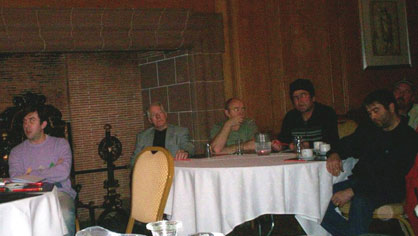2 February 2009
There should be more effective ways for fishermen to provide information on the environmental impact of marine developments.
That is what Cefas scientists heard at recent NFFO ports visits in Barrow and Fleetwood. Cefas had been invited to the ports to discuss their role in marine development planning and answer questions about environmental impacts. Few others have the in-depth knowledge on local ecology of an area than fishermen, but too often the industry’s views are regarded as “anecdotal” and are discounted by scientists and consultants. In fact, treated in the right way they can form a powerful line of evidence. The meetings heard that there are also opportunities for fishermen to become directly involved in the planning of scientific studies and in data gathering at proposed site locations. Early and proactive engagement by developers in planning projects is key to successful collaboration, together with the support of government agencies such as Cefas.
Under proposals for gas storage and offshore renewable energy installations, the eastern Irish Sea is fast becoming one of the most developed marine areas in the UK. Together with government plans for Marine Conservation Zones, the need for an improved understanding of the marine environment has never been so paramount.
NFFO has worked closely with Cefas and Defra to develop the successful Fisheries Science Partnership programme which has primarily focused on the important area of improving stock assessments. The Barrow and Fleetwood meetings, attended by NFFO’s Dale Rodmell and Alan McCulla heard that it is feared that these kind of offshore developments will have an impact on stock abundance, but such impacts are never factored into the stocks assessment process. Noise from pile driving, interference from electricity cables on electro-sensitive shark species, the discharge of saline brine from the solution mining of gas caverns and the use of pingers to deter marine mammals are of concern to fishermen in their possible effects upon the local stock abundance. Fish stocks in Morecambe Bay are at an historical low according to local industry, despite the low amount of fishing effort taking place. Against this background, Cefas were called upon to shed some light on the problem.

